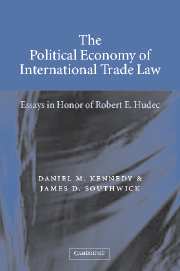Book contents
- Frontmatter
- Contents
- List of contributors
- Preface
- Foreword by E. THOMAS SULLIVAN
- Introduction: An overview of the volume
- Part I The constitutional developments of international trade law
- Part II The scope of international trade law: Adding new subjects and restructuring old ones
- Part III Legal relations between developed and developing countries
- 10 The Uruguay Round North–South Grand Bargain: Implications for future negotiations
- Comment: The Uruguay Round North–South bargain: Will the WTO get over it?
- 11 The TRIPS-legality of measures taken to address public health crises: Responding to USTR–State–industry positions that undermine the WTO
- Comment: The TRIPS Agreement
- 12 “If only we were elephants”: The political economy of the WTO's treatment of trade and environment matters
- Comment: The dynamics of protest
- 13 The Seattle impasse and its implications for the World Trade Organization
- Comment: Trade negotiations and high politics: Drawing the right lessons from Seattle
- 14 Developing country interests in WTO agricultural policy
- Comment: WTO and policy reform in developing countries
- Part IV The operation of the WTO dispute settlement procedure
- Bibliography of works by ROBERT E. HUDEC
- Index
13 - The Seattle impasse and its implications for the World Trade Organization
Published online by Cambridge University Press: 02 September 2009
- Frontmatter
- Contents
- List of contributors
- Preface
- Foreword by E. THOMAS SULLIVAN
- Introduction: An overview of the volume
- Part I The constitutional developments of international trade law
- Part II The scope of international trade law: Adding new subjects and restructuring old ones
- Part III Legal relations between developed and developing countries
- 10 The Uruguay Round North–South Grand Bargain: Implications for future negotiations
- Comment: The Uruguay Round North–South bargain: Will the WTO get over it?
- 11 The TRIPS-legality of measures taken to address public health crises: Responding to USTR–State–industry positions that undermine the WTO
- Comment: The TRIPS Agreement
- 12 “If only we were elephants”: The political economy of the WTO's treatment of trade and environment matters
- Comment: The dynamics of protest
- 13 The Seattle impasse and its implications for the World Trade Organization
- Comment: Trade negotiations and high politics: Drawing the right lessons from Seattle
- 14 Developing country interests in WTO agricultural policy
- Comment: WTO and policy reform in developing countries
- Part IV The operation of the WTO dispute settlement procedure
- Bibliography of works by ROBERT E. HUDEC
- Index
Summary
Cabinet ministers of the World Trade Organization (WTO)'s 135 member states gathered in Seattle on November 30, 1999. Earlier, members accounting for a large majority of world trade had said that their purpose in Seattle was to launch a new multilateral round, one that would extend the sequence of eight large-scale negotiations that had liberalized trade and elaborated international rules since the Second World War.
As everyone knows, American critics used the occasion to organize a large campaign to protest globalization and the WTO and to attack its core norm of trade liberalization. They and allies from other countries circulated pamphlets painting the WTO as an unaccountable tool of greedy corporations and blaming it for world social and environmental problems. On the first day union members, environmentalists, consumer advocates, and students marching in three columns converged on downtown Seattle chanting “No new round, turnaround.” Police allowed protestors to penetrate the space between the convention center and the hotels and block the ministers from entering the hall for a day. In the chaos the Colombian minister was knocked to the ground. Privately one of his officials groused that if the same had happened to an American cabinet secretary in Bogotá, the State Department would have declared a travel advisory on Colombia for six months. The minister from Estonia sputtered as he walked away, “I'm a socialist!… You people are nuts.”
- Type
- Chapter
- Information
- The Political Economy of International Trade LawEssays in Honor of Robert E. Hudec, pp. 400 - 429Publisher: Cambridge University PressPrint publication year: 2002
- 4
- Cited by



